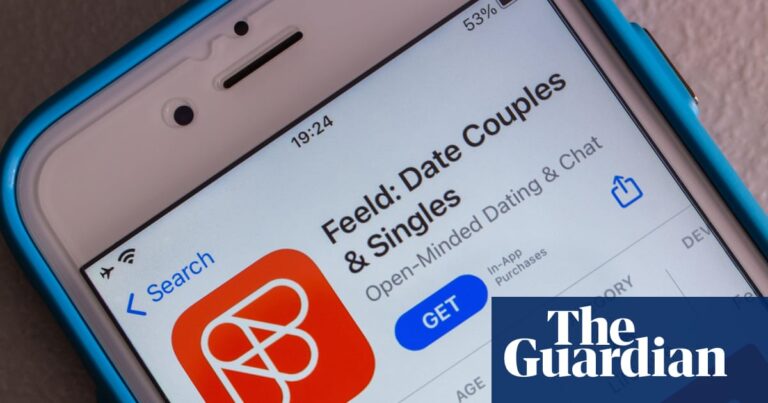
Gen Z was more likely to choose financial stability over love than their millennial elders, according to a new report.
While 59 percent of millennials said they would prioritize a “broke and magical” relationship over financial security, only 54 of Gen Z said the same in a new Tawkify survey of 1,000 Americans.
Why It Matters
Both millennials and Gen Z have faced their fair share of financial challenges, including skyrocketing costs of higher education, student loan debt, an increasingly unaffordable housing market and surging inflation on everyday necessities.
However, Gen Z may be a bit more cash strapped than millennials. New survey data from Empower reported that Gen Z participants pay an average of $526 per month toward student loans, significantly above the overall average payment of $284 for all age groups.

Alexi Rosenfeld/Getty Images
What To Know
Roughly 46 percent of Gen Z said they would choose long term financial stability over romantic love in 2025, compared to just 41 percent of millennials.
“Millennials have been through more, they’ve had time to explore love, make mistakes, and go through breakups,” Kevin Thompson, the CEO of 9i Capital Group and the host of the 9innings podcast, told Newsweek. “Gen Z, on the other hand, came of age during economic chaos. Many of them have only known the broke experience, so it’s no surprise that financial stability ranks higher on their list. They’re trying to avoid what they’ve seen; the struggle, stress, and survival mode.”
Across the larger population, Americans were far more likely to choose love over monetary success. The survey reported that around two in three Americans, or 63 percent, would marry for love even if it meant a lifelong financial struggle.
Older generations were generally more skeptical of the power of love over finances, with only 48 percent of baby boomers and 46 percent of Gen X likely to prioritize love over financial security.
That potentially makes Gen Z’s inclination for financial security over love beyond millennials’ indicative of larger economic trends they are facing in their personal lives, experts say.
Gen Z has been stereotyped as often glued to social media, where they are presented with certain depictions of celebrity and influencer wealthy lifestyles.
And since Gen Z came of age during the 2020 recession, they watched millennials get crushed by housing costs, gig economy, and endless “experiences over things” mantras that left bank accounts empty, said Michael Ryan, a finance expert and founder of MichaelRyanMoney.com.
“Gen Z isn’t choosing money over love,” Ryan told Newsweek. “They’re choosing survival. Why? Because they’ve watched their older siblings drown in student debt while Instagram-perfect couples split over Venmo requests.”
Women were also more likely to choose love over money in the report, with 58 percent saying they’d prioritize the “broke and magical relationship” over financial security, whereas just 51 percent of men said the same.
The exact financial situation daters are looking for in a partner varies by generation.
Gen X and baby boomers said their ideal partner would have an average salary of $115,000, while millennials and Gen Z said $100,000 and $80,000 respectively.
What People Are Saying
Brie Temple, COO and chief matchmaker at Tawkify, told Newsweek: “They don’t think of it as being cold, they think of it as being clever. It’s a pragmatic attitude born out of a struggling economy and an actual fear of repeating the mistakes of the past. Long term, this may cause more people to put relationships, marriage, or even having children on hold, not because they don’t want them, but because they don’t feel prepared. Gen Z isn’t abandoning love; they just need to be in a good spot before they take the leap.”
Kevin Thompson, the CEO of 9i Capital Group and the host of the 9innings podcast, told Newsweek: “Longer term, this shift in priorities could have real consequences—delayed marriages, fewer kids, and relationships that are more transactional than emotional. You’re already seeing younger women having children with older men, and divorce rates creeping up. It’s all tied to a larger economic reality: love is still important, but financial peace of mind is becoming the non-negotiable.”
Alex Beene, a financial literacy instructor for the University of Tennessee at Martin, told Newsweek: “This may come as no surprise, as the Millennial generation typically gets labeled as being one that favors experiences over consumer goods and activism over comfort. With Gen Z, we’ve seen this thinking revert back to prior generations that favored financial stability over other traits a relationship could carry with it. A society with more financial stability is a good one not just for the overall economy, but the finances of individual households.”
Michael Ryan, a finance expert and founder of MichaelRyanMoney.comtold Newsweek: “Gen Z has seen what happens when you choose the charming barista over the boring accountant, eviction notices and ramen diets… A ‘broke and magical’ relationship hits different when gas is $3.50 and groceries cost $200 weekly. Gen Z understands that love doesn’t pay rent.”
Dr. Wendy Walsh, a relationship expert for DatingAdvice.com and psychology professor at California State University Channel Islands, told Newsweek: “Gen Z is the building generation. They are still building their lives and acquiring stuff. These young people are sharing rented apartments with roommates or still living in their parents’ homes. Financial security is associated with freedom for Gen Z.”
What Happens Next
Ryan said the generational shift is likely to reshape dating culture, where compatible credit scores are more likely to attract each other.
“Expect delayed partnerships until financial stability is achieved, financial compatibility replacing ‘spark’ as the primary filter,” Ryan said.
“Romance isn’t dead. It’s just got better financial planning.”



